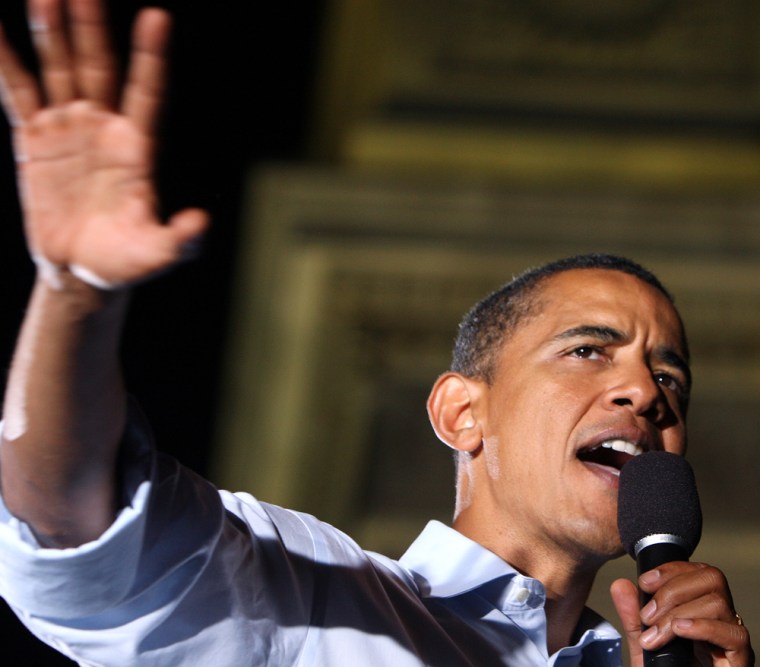In a speech here today, Senator Barack Obama castigated political leaders of both parties for failing to vigorously challenge the administration’s Iraq policy in 2002, declaring: “The American people weren’t just failed by a president, they were failed by much of Washington.”
As the fifth anniversary approaches of the Congressional vote that gave President Bush authority to wage war, Mr. Obama is seeking once again highlight his early opposition to invading Iraq. In a 30-minute address on the campus of DePaul University, Mr. Obama did not mention his rivals by name, but said voters should keep the distinctions in mind among the Democratic presidential candidates.
“This is not just a matter of debating the past,” Mr. Obama said. “It’s about who has the best judgment to make the critical decisions of the future.” Because you might think that Washington would learn from Iraq, but we’ve seen in this campaign just how bent out of shape Washington gets when you challenge its assumptions.”
While his position of going forward in Iraq is largely similar to his leading rivals, Senator Hillary Rodham Clinton and John Edwards, Mr. Obama said members of Congress should be held accountable for voting “to give president the open-ended authority to wage war that he uses to this day.” Mr. Edwards, then a Senator from North Carolina, has expressed regret for approving the war, and Mrs. Clinton has said she cannot go back but added that knowing what she knows now she wouldn’t have voted for it.
“This election is about ending the Iraq War, but even more it’s about moving beyond it,” said Mr. Obama, who was elected to the Senate in 2004. “And we’re not going be safe in a world of unconventional threats with the same old conventional thinking that got us into Iraq.”
Mr. Obama used Iraq to illuminate a broader view of the country’s foreign policy, focusing half of his remarks to other threats facing the United States. He proposed setting a goal of eliminating all nuclear weapons in the world, saying America should greatly reduce its stockpiles to lower the threat of nuclear terrorism.
“We will not pursue unilateral disarmament,” Mr. Obama said. “As long as nuclear weapons exist, we’ll retain a strong nuclear deterrent, but we’ll keep our commitment under the Nuclear Non Proliferation Treaty on the long road towards eliminating nuclear weapons.”
In doing so, Mr. Obama added his voice to a plan endorsed earlier this year by a bipartisan group of former government officials from the cold war era who say the United States must begin building a global consensus to reverse a reliance on nuclear weapons that have become “increasingly hazardous and decreasingly effective.”
Mr. Obama also called for pursuing vigorous diplomatic efforts aimed at a global ban on the development, production and deployment of intermediate-range missiles.
“The best way to keep America safe is not to threaten terrorists with nuclear weapons,” he said. “It’s to keep nuclear weapons and nuclear materials away from terrorists.”
If elected, Mr. Obama said he would lead a global effort to secure nuclear weapons and material at vulnerable sites within four years. He also will pledge to end production of fissile material for weapons, agree not to build new weapons and remove any remaining nuclear weapons from hair-trigger alert.
In his speech, Mr. Obama called for using a combination of diplomacy and pressure to prevent Iran from acquiring nuclear weapons and to eliminate North Korea’s nuclear weapons programs. Aides did not say what Mr. Obama intended to do if diplomacy and sanctions failed.
In setting a goal of eliminating nuclear weapons in the world, Mr. Obama endorsed a call for “urgent new actions” to prevent a new nuclear era that was laid out in January in a commentary in The Wall Street Journal written by several former government officials.
The authors of the article were George P. Shultz, secretary of state in the Reagan administration; Henry Kissinger, secretary of state in the Nixon and Ford administrations; William J. Perry, secretary of defense in the Clinton administration; and Sam Nunn, a former chairman of the Senate Armed Services Committee.
Still, the speech, Mr. Obama’s fourth foreign policy address, was framed largely around the mistakes of the Iraq war.
“The American people weren’t just failed by a president,” Mr. Obama said, “they were failed by much of Washington, by a media that too often reported spin instead of facts, by a foreign policy elite that largely boarded the bandwagon for war, and most of all, by the majority of a Congress — a co-equal branch of government — that voted to give the president the open-ended authority to wage war that he uses to this day.”
